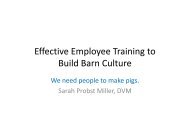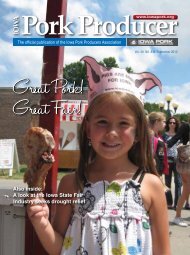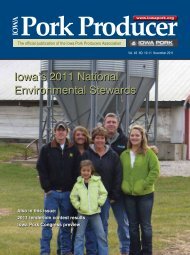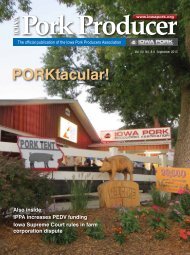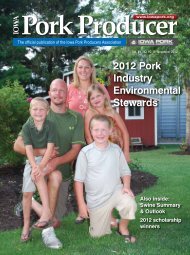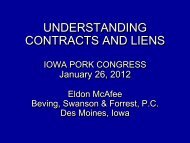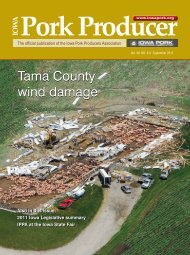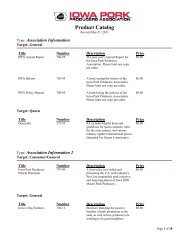Pork Congress 2012 - Iowa Pork Producers Association
Pork Congress 2012 - Iowa Pork Producers Association
Pork Congress 2012 - Iowa Pork Producers Association
Create successful ePaper yourself
Turn your PDF publications into a flip-book with our unique Google optimized e-Paper software.
News from the<br />
National <strong>Pork</strong> <strong>Producers</strong> Council<br />
NPPC statement on McDonald’s sow<br />
housing decision<br />
McDonald’s Corp. announced Feb. 13 that it would begin<br />
developing a plan to transition its pork supply away from<br />
farmers who use conventional sow gestation stalls.<br />
The National <strong>Pork</strong> <strong>Producers</strong> Council issued a statement in<br />
response to the announcement, saying it’s an opportunity<br />
for the pork industry to respond to its customers.<br />
Farmers and animal care experts know that various types of<br />
housing systems can provide for the well-being of pigs. After<br />
an extensive review of scientific literature, the American<br />
Veterinary Medical <strong>Association</strong> determined that both<br />
individual sow housing and group housing can provide for<br />
the well-being of sows.<br />
Perhaps most importantly, McDonald’s announcement<br />
reflects the best process for meeting evolving<br />
consumer demands – through the market, not through<br />
government mandates. <strong>Pork</strong> industry customers have<br />
expressed a desire to see changes in how pigs are raised.<br />
Farmers are responding and modifying their practices<br />
accordingly. That process is effective, it’s efficient and<br />
doesn’t require an act of <strong>Congress</strong>.<br />
The pork industry supports a free market; it opposes<br />
legislative mandates on farmers pushed by special<br />
interest groups. Farmers are some of the most innovative<br />
and resourceful people in our country. They will<br />
continue to meet the ever-changing needs of customers<br />
and provide consumers with safe, nutritious and<br />
affordable food produced responsibly.<br />
NPPC stands ready to offer its assistance to McDonald’s as it<br />
assesses sow housing.<br />
U.S. pork exports reach new heights in<br />
2011<br />
The U.S. pork industry exported a record amount of<br />
product in 2011, according to data released in February by<br />
the U.S. Department of Agriculture.<br />
The U.S. pork industry exported more than $6.1 billion<br />
– about 2.3 million metric tons – of pork last year,<br />
topping the previous record of $4.9 billion exported in<br />
2008. Exports increased by 18 percent in volume and 28<br />
percent by value compared with 2010 pork exports. Japan<br />
again was the No. 1 export market for U.S. pork, with<br />
$1.96 billion. Other top export markets included Mexico,<br />
Canada and China. The record numbers were driven by<br />
strong demand in China, South Korea and Japan.<br />
In the coming year, NPPC will continue to press the Obama<br />
administration to keep export markets open to U.S. pork and<br />
will advocate for the acceptance of new free trade agreements<br />
to expand U.S. pork exports abroad.<br />
NPPC opposes federal ‘farm takeover’ bill<br />
The National <strong>Pork</strong> <strong>Producers</strong> Council criticized congressional<br />
legislation introduced Jan. 23 that would prescribe cage<br />
sizes for egg-laying hens, saying it would set a “dangerous<br />
precedent” for allowing the federal government to regulate<br />
on-farm production practices, including animal housing.<br />
The legislation seeks to codify an agreement the Humane<br />
Society of the United States came to with the egg industry.<br />
HSUS agreed to forego trying to pass state ballot initiatives<br />
that would dictate egg production practices and to stop 10<br />
years of litigation against and undercover investigations of the<br />
egg industry in exchange for egg producers nearly doubling<br />
the size of their cages for laying hens. In addition to cage sizes,<br />
the bill, H.R. 3798, includes labeling requirements for eggs<br />
and new air-quality standards for hen houses.<br />
NPPC says the legislation would take away producers’<br />
freedom to operate in ways that are best for their animals,<br />
make it difficult to respond to consumer demands, raise retail<br />
food prices and take away consumer choice, devastate small<br />
and niche producers and, at a time of constrained budgets for<br />
agriculture, redirect valuable resources from enhancing food<br />
safety and maintaining the competitiveness of U.S. agriculture<br />
to regulating on-farm production practices for reasons other<br />
than public and animal health.<br />
NPPC is urging congressional lawmakers to oppose the<br />
“Farm Takeover Bill.”<br />
56 March <strong>2012</strong>




